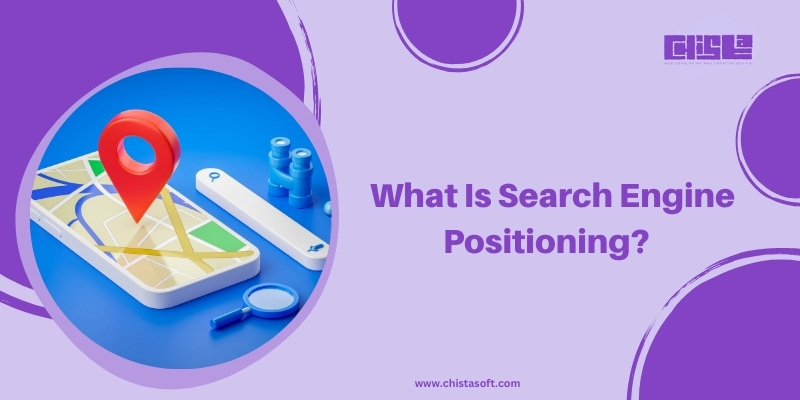What is Search Engine Positioning?
Search engine positioning is the process of optimizing a website’s content and structure to enhance its visibility and ranking on search engine results pages. This includes utilizing different strategies like keyword research, on-page optimization, link building, and content creation to help a website appear higher in search engine results for relevant questions. The purpose of search engine positioning is to enhance organic traffic to a website and finally drive more conversions and revenue.
Why the Search Engine Positioning is Important for Your Business?

Search engine positioning is essential for businesses since it directly affects their online visibility and accessibility to potential customers. By optimizing their website for search engines, businesses can enhance their chances of appearing higher in search results, which can result in more organic traffic and potential customers visiting their sites. Enhanced search engine positioning can also help establish credibility and trust with the audience, as websites that rank higher are usually understood as more authoritative and trustworthy. Finally, a strong search engine positioning strategy can help businesses draw more targeted traffic, generate leads, and increase conversions, resulting in overall business growth and success.
Benefits of Search Engine Positioning

Some of the main benefits of search engine positioning are:
- Enhanced visibility: By optimizing your website for search engines, you can enhance its visibility and reach a larger audience of potential customers.
- Higher website traffic: Enhanced search engine positioning can result in higher organic traffic to your website, as your site is more likely to appear in related search results.
- Improved brand credibility: Websites that rank higher in search results are usually perceived as more reliable and trustworthy by users, which can help boost your brand reputation.
- Better user experience: Search engine optimization (SEO) practices can also enhance the overall user experience on your website, making it easier for users to find the information they want.
- Cost-effective marketing: In comparison with traditional advertising methods, search engine positioning can be a cost-effective way to draw targeted traffic to your website and create leads.
- Long-term results: A well-executed search engine positioning strategy can result in long-term advantages for your business, as your website continues to draw organic traffic over time.
Search Engine Positioning vs. SEO

Search engine positioning and search engine optimization (SEO) are inextricably related concepts but have some main differences:
Search engine positioning is the overall strategy of optimizing a website’s content and structure to enhance its visibility and ranking on search engine results pages. It includes different tactics like keyword research, on-page optimization, link building, and content creation to help a website appear higher in search results for related questions.
On the other hand, SEO specifically refers to the process of optimizing a website to enhance its visibility and ranking on search engine results pages. SEO includes a more concentrated approach to enhancing a website’s search engine performance through strategies such as keyword optimization, meta tags, site speed optimization, and mobile responsiveness.
In general, search engine positioning is a wider term that includes the overall strategy of optimizing a website for search engines, while SEO is a specific set of tactics and techniques employed to enhance a website’s search engine performance. Both are crucial for businesses seeking to improve their online visibility, attract more traffic, and drive conversions.
Learn more: What Is SEO?
How It is Possible for a search Engine to Determine a Page’s Position?

A search engine determines a page’s position in search results according to many different factors, such as relevance to the search query, quality of content, user engagement metrics, website authority, and technical issues such as page load speed and mobile-friendliness. Search engines utilize complicated algorithms to analyze and rank web pages based on these criteria, with the purpose of providing users with the most relevant and the best results for their search queries.
Best Practices for Search Engine Positioning Improvement

Some best practices for enhancing search engine positioning include:
- Perform keyword research to find relevant and high-traffic keywords for your content.
- Optimize on-page elements like title tags, meta descriptions, headings, and image alt text with targeted keywords.
- Create consistent, relevant, and engaging content that provides value to users.
- Enhance website loading speed and guarantee mobile-friendliness for a better user experience.
- Build high-quality backlinks from reliable websites to enhance your website’s authority.
- Utilize structured data markup to help search engines perceive your content better.
- Regularly check and analyze your website’s performance using tools such as Google Analytics and Search Console to recognize areas for enhancement.



The essay mentioned some excellent stuff, which was very helpful to me.
I appreciate your thoughtful feedback.
Pay attention to long-tail keywords. These are more specialized and longer terms that may have a lower search volume but can attract more qualified traffic with less competition. Pay attention to the keyword difficulty scores that SEO tools report. To create a well-balanced strategy, try to combine highly competitive and low-competition keywords in order to achieve a good position in the Google search engine.